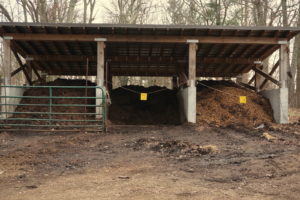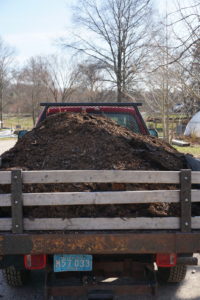 “It’s like a brownie recipe,” explains NCOF Executive Director Casey Townsend, as he stirs together a large scoopful of wood chips with cow manure in NCOF’s three-tiered composting pad. But Townsend’s not making brownies; he’s making compost, otherwise known in farming circles as “black gold.”
“It’s like a brownie recipe,” explains NCOF Executive Director Casey Townsend, as he stirs together a large scoopful of wood chips with cow manure in NCOF’s three-tiered composting pad. But Townsend’s not making brownies; he’s making compost, otherwise known in farming circles as “black gold.”
Composting is the natural process of breaking down organic matter, like food scraps, wood chips, fallen leaves, and animal manures. A potent natural fertilizer, finished compost enriches the soil, helps it to retain moisture, and supports a wide variety of microorganisms in the soil, all of which cause farm crops to grow and flourish.
NCOF has been making compost since its founding in 1975. Not only is the process good for the planet, but it also saves us thousands of dollars a year since we don’t need to buy fertilizer from outside sources. What a deal!
Managing compost is a year-round operation here at NCOF, and involves getting large amounts of wood chips, manure, and leaves in the right proportions to help the microorganisms do their work. Once all of the ingredients are mixed together, they heat up through the natural process of decomposition. NCOF makes 7 to 10 dump truck loads of finished compost every year for its no-till operation.
While anything that grows will eventually decompose, using a composting pad speeds up the process by providing an improved and controlled environment for bacteria and other decomposing organisms, like worms, to do their work. The pad also keeps the nutrients in the finished compost from leaching into the soil. When the compost pile reaches about 130 degrees Fahrenheit for four days, and is fully broken down into a dark, rich mixture, it is ready to be applied to the fields where it can be used by growing plants.
“Composting keeps us from wasting food,” notes Townsend. Think about all of the vegetable peels and forgotten leftovers that end up in your trash can at home, or in the dumpsters of American schools, and grocery stores. The United States wastes about 40% of the food it produces every year. When all that wasted food piles up in landfills, the microorganisms that would normally break down the organic matter don’t have access to enough oxygen to function. Instead, the organic matter gets broken down by bacteria though anaerobic decomposition. This process generates biogases, like methane and carbon dioxide, which contribute to climate change.
We will continue composting at NCOF, giving back to our soil and keeping our crops healthy. If you’re interested, more information about composting at home can be found here.

